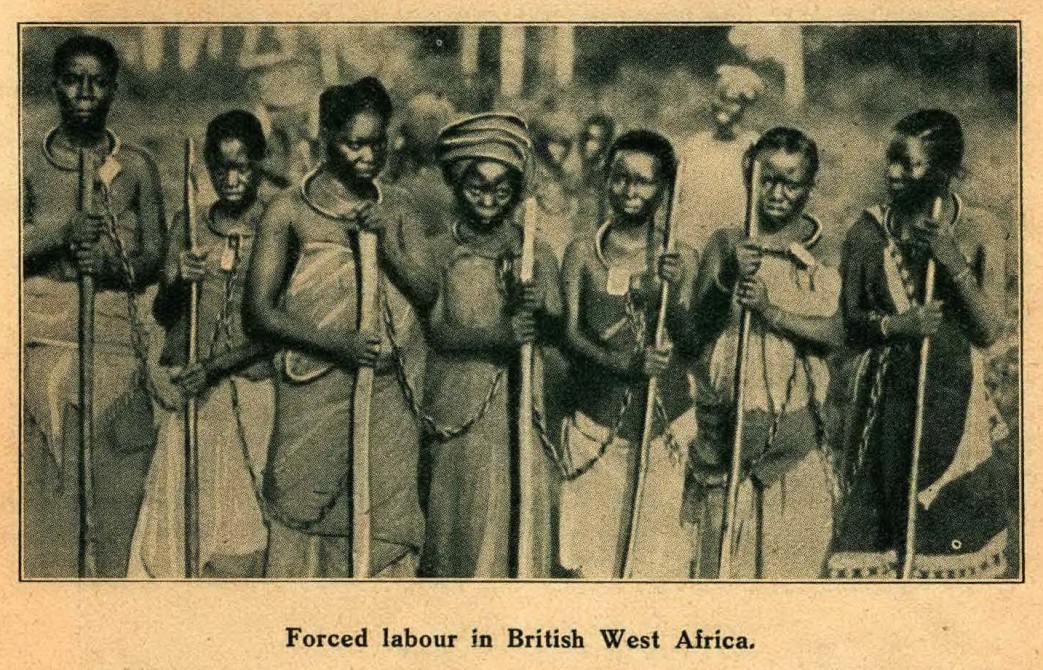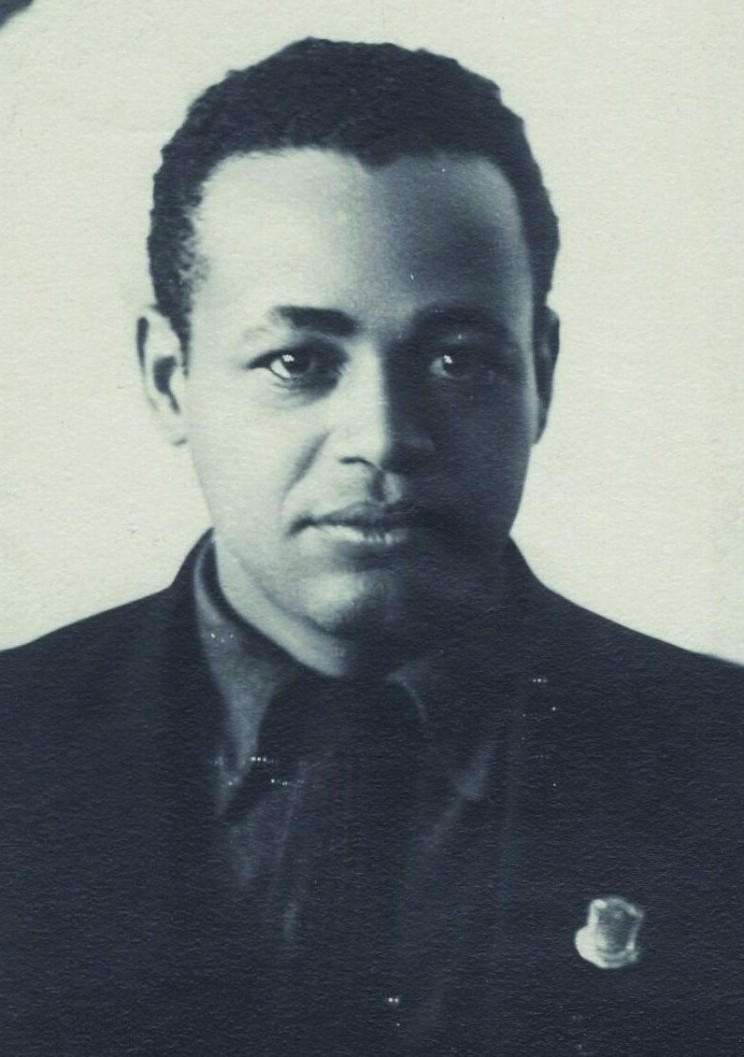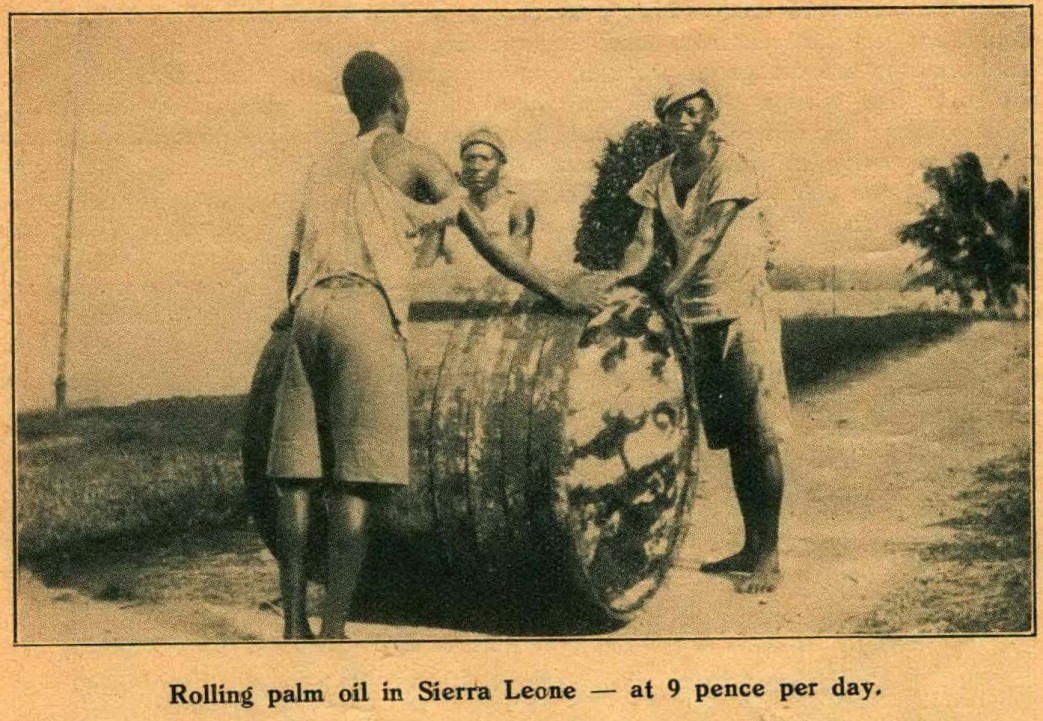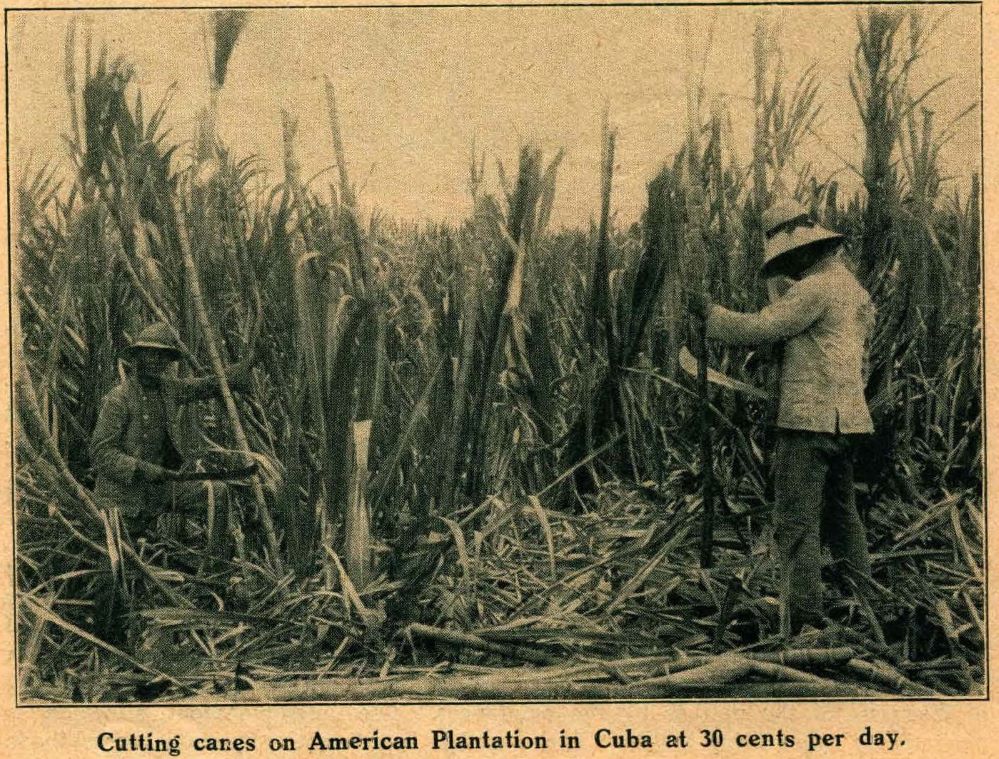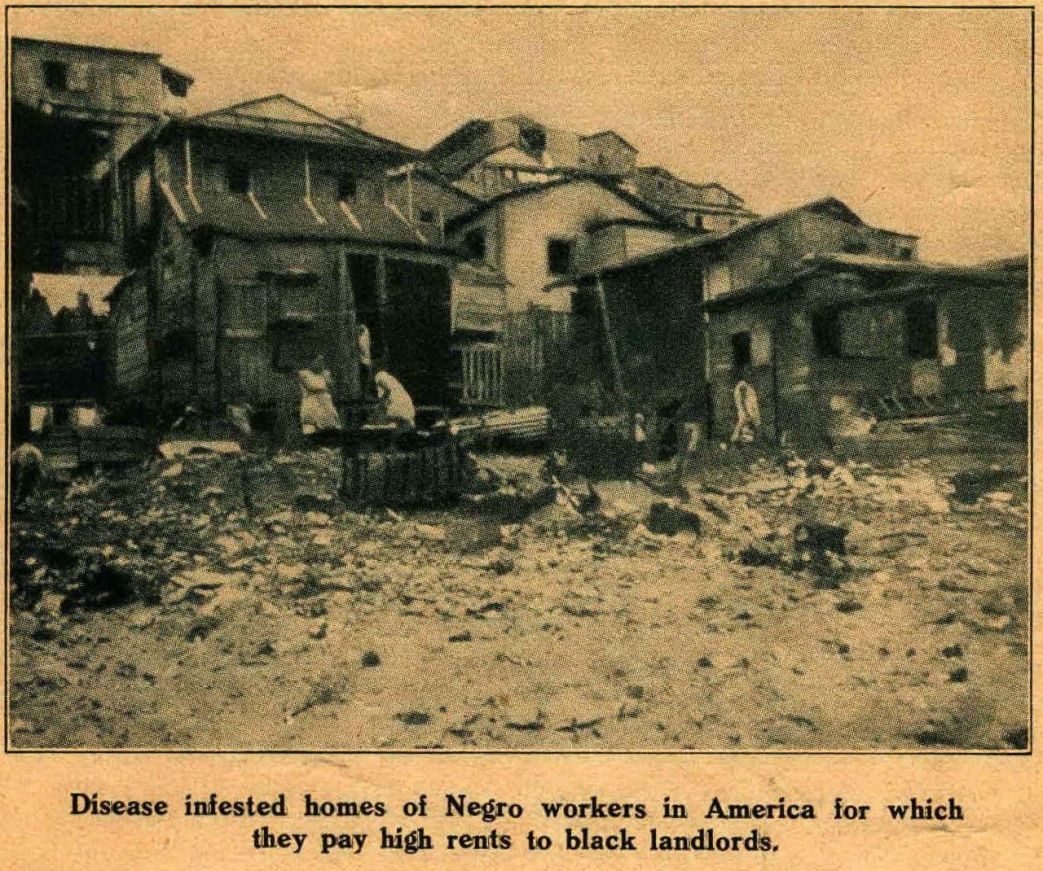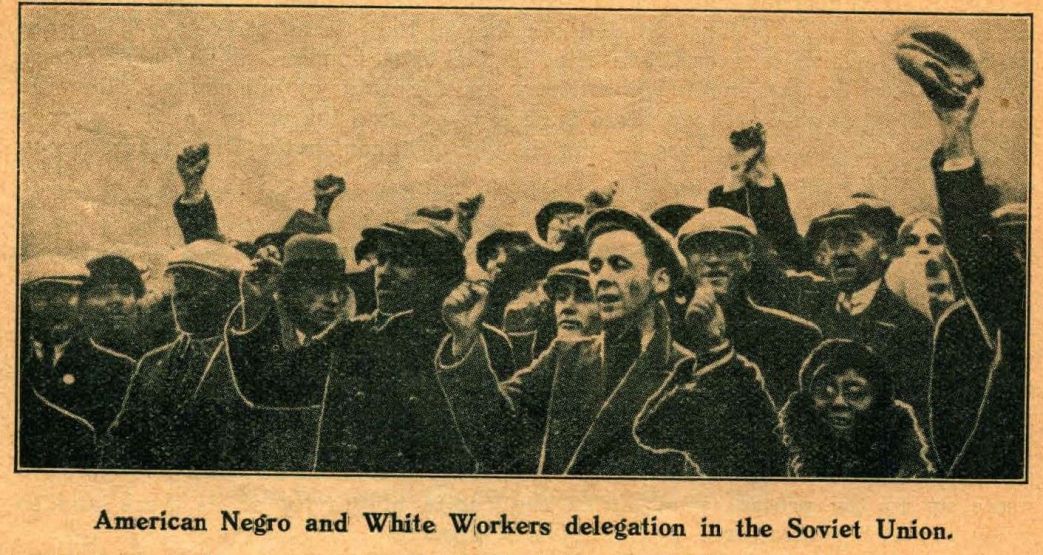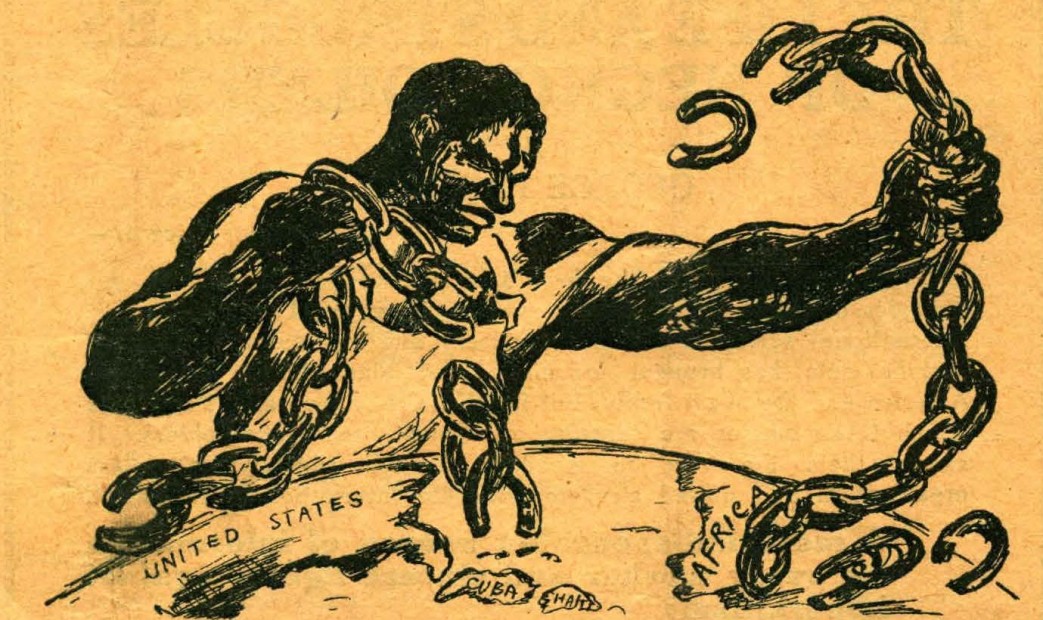A major, sometimes sharply critical, report by Otto Huiswoud to a plenum of the R.I.L.U. speaking as Chair of the Profintern’s Negro Trade Union Committee. A wide-ranging survey on the condition eighteen months into the global depression of Black workers in Africa and the diaspora, as well the failures, and some success, of R.I.L.U. affiliates to organize Black labor.
‘The Economic Crisis and the Negro Workers’ by Otto E. Huiswoud from The Negro Worker. Vol. 2 Nos. 2 & 3. March & April, 1932.
Editor’s note: The following is the first part of a report made at the recent plenum of the Red International of Labour Unions by comrade O. E. Huiswood, chairman of the Negro Trade Union Committee. It gives an analysis of the world economic crisis and its effects upon the Negro workers in America, Africa and other colonies, and the struggles which they are conducting against wage cuts, longer hours, and unemployment. The concluding section dealing with strikes and demonstrations of the workers against starvation and taxation in Africa and the West Indies will appear in the next issue of our journal. The Red International is the only trade union international organization which pays any attention to coloured workers, helping them to organize so that they can get better conditions. This is just the opposite policy of the reformist trade unions, such as the Amsterdam International, the American Federation of Labour and the British Trade Union Council. The reformist leaders who control these organizations are only interested in the coloured workers in so far as they can help the capitalists to rob them. They are the imperialists agents in the ranks of the workers. Negro workers in all parts of the world, especially in Africa should therefore read this report carefully and write us about their conditions. We appeal to Negro editors in the colonies to reprint this report in order to inform the workers of the conditions and struggles of their black class brothers in various countries.
The Economic Crisis and the Negro Workers
The Capitalist Offensive
Even before the present world economic crisis of capitalism, the conditions of the Negro toiling masses were among the lowest in the world. Everywhere they are relegated to the most degrading forms of unskilled labour and even in the few instances where they have been permitted to work in semiskilled and skilled occupations they received less wages for the same work as performed by the white workers. Through these and other methods, the capitalists extract super-profits out of the toil of the Negro masses on the basis of which they are able to bribe the upper strata of the white labour aristocrats. However, since the crisis the economic, political and social status of the Negro toilers has become ever more intolerable.
The economic crisis has affected with particular severity the millions of super-exploited black workers of the African Continent, the West Indies and of the United States. The results of this are manifested in the widespread unemployment, the complete ruination of millions of peasants due to the ruthless imperialist policy of land expropriation and in the policy of continuous introduction of newer and heavier taxes on these toiling masses. Besides, the banks and trusts, through the monopoly control over peasant production are able on the one hand, to continually crush down these peasant masses ever further and further and one the other hand, through the inflation of monopolist prices of the manufactured products to take away from the peasants ever higher and higher amounts for these commodities. These conditions have brought about indescribable misery among the industrial workers and peasants in Africa and throughout the Black World.
As the crisis deepens the imperialists intensify their attack upon the Negro toiling masses on whose backs they hope to throw the major part of the burden in their attempt to find a way out of their difficulties. The reasons for this are obvious.
First, Africa and those colonial and semi-colonial countries which are inhabited largely by Negroes represent the last stronghold of world imperialism.
Secondly, the vast majority of the Negro workers in the United States and in the colonies are still largely unorganized, thanks to the policy of the reformist trade union bureaucrats who place the Negro workers in a special category and whose policy is the same as the imperialist policy of isolation of the Negro masses from the struggle of the white workers so that the imperialists can all the more better exploit them.
This is the policy of the social imperialists of Amsterdam and the second International, as well as of the repeated acts of betrayal of the Negro reformists within and without the trade union movement who are going more and more over to the side of the capitalists and who are aiding either directly or indirectly in the attempt to suppress the growing movement of revolt on the part of the Negro masses. But in spite of this growing repression, in spite of the terror we see everywhere, the growing mass movement of the Negro toiling masses against oppression, against the various forms of terror which is launched against them by the imperialists, and we notice recently in the United States the beginning of the development of a joint struggle on the part of the black masses with the white for a final struggle against capitalist exploitation and oppression. This situation calls for the doubling of our energies in order to win over these exploited Negro masses and to draw them into our activity. The growing revolts against taxation which have been occurring and are still going on in West Africa, in the Belgian Congo, must get the immediate attention of the R.I.L.U. sections in developing a mass movement and drawing them in the orbit of revolutionary struggle. We must make the African colonies the center of gravity of our work.
Not Sufficient Support for Colonial Struggles.
But it must be said at the outset that the national sections of the R.I.L.U. in spite of the adoption of the resolution at the 5th Congress on the work among the Negro workers have not translated the resolution into action. But rather, as is quite often the case, they have simply resolved to do nothing. With the result that we find that in these colonies, practically no work has been done on the part of the sections of the R.I.L.U., not even in the metropolitan countries. We must ask our French comrades, to give us an idea of what work was done in the French colonies since the 5th Congress of the R.I.L.U., what work has been done by the French section of the R.I.L.U. among the 50,000 Negro workers in France? How many have we got in our revolutionary trade unions? I don’t think they have 2. What work has been done in the French colonies? And when we realize the fact that today the French imperialists are striving fast to create a huge professional army among the Negro colonials and are beginning to depend more and more upon this black colonial army for the next war and for war against the Soviet Union; when we recognize and realize the fact that the reformists in France are attempting in a number of ways to draw in the Negro workers to fight on the side of the imperialists, we must ask the question, what work are our French comrades doing in the colonies? The same thing applies to our comrades in Great Britain. In Great Britain there are permanent colonies of Negroes in London, in Cardiff and in Liverpool. But are they in the revolutionary trade union movement? What is being done to get these Negro workers acquainted with our program, what is being done to get them into our movement? Not only so far as the Negroes who reside in England are concerned, but those in the colonies, in Africa, in the British West Indies. Our British comrades have up to date not taken the first steps in beginning some actual work amongst these colonials. We see in the United States the beginning of some work among the Negro workers by the T.U.U.L. but one must say that the work of the T.U.U.L. among the Negro masses in the United States is today too abstract, too general and not one real attempt is made to begin the actual organizational work in a number of industries which are basic industries where we have large numbers of Negro workers. No work is being done to draw them into the T.U.U.L. There are a number of industries where there are Negroes concentrated in which the T.U.U.L. can and should begin to actually carry on some struggles and carry on some work in order to draw these Negro workers into our movement.
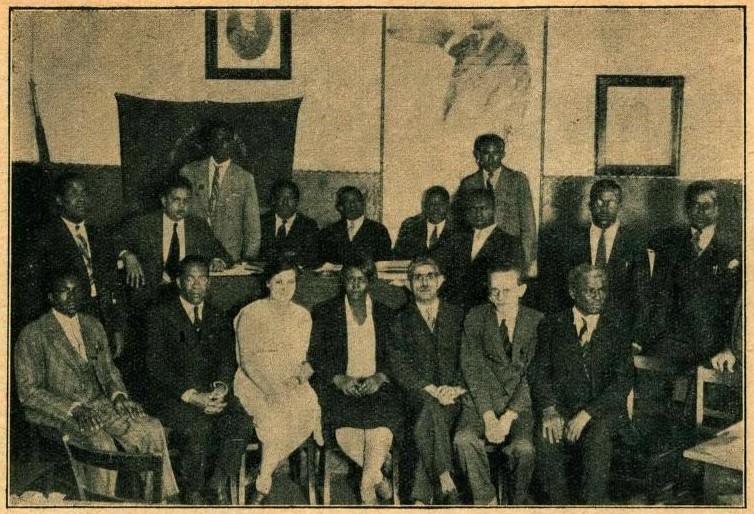
Here we see some very evident weaknesses so far as the activities of the T.U.U.L. is concerned and yet the conditions are particularly favourable. For instance, as comrade Stachel pointed out that in the miners’ strike 6,000 Negroes participated, which is nearly one-fifth of the total number of strikers. These Negro strikers fought and fought bitterly on the side of our union. Now the problem is to be able to keep these miners, to develop the union, to have a large membership of Negro workers this is the task confronting the miners union at the present time.
Achievements and Weaknesses of Committee.
While the International Trade Union Committee of Negro Workers can register certain steps forward since the 5th World Congress, in widening its contacts and in rendering political and organizational aid to the workers in the colonies, particularly in South Africa, and to a certain extent in the West Indies, nevertheless we must say that the work of the Negro Trade Union Committee up to the present time has been largely of a propagandist character, largely one of making contacts here and there. The Negro Committee was not able to make up to the present time Africa the centre of gravity of its work and to begin actual organizational work on this Continent.
The immediate task before the Negro Committee is the question of crystallization and broadening these contacts and of actually beginning to lay the basis for organization in Africa.
Unemployment in South Africa.
I want to dwell for a few minutes on the actual situation of unemployment among the Negro masses. In South Africa, we have today a growing unemployment among the native workers and agricultural workers and also among the poor whites who are flocking into the towns, who are leaving the farms in order to seek work in the cities and are swelling the already large army of unemployed. In the cities fully 50% of the native workers are unemployed which totals about 250,000 workers. The effects of the agrarian crisis has been so tremendous in South Africa that the mass of poor white farmers are drifting into the cities to find work. We find in many sections of South Africa an actual famine condition. This condition has led to the complete bankruptcy of large sections of the poor white farmers.
And what is the solution to this situation as proposed by the ruling class of South Africa?
Through the “Civilized Labour Policy” of the South African Government we find the dismissals of native workers taking place not only in skilled work, but also in semi-skilled work, in unskilled work. The jobs from which the natives are dismissed are being handed over to white workers as a means of course of fostering a breach between the whites and the blacks and to prevent their joint action. Mr. Creswell, Minister of Labour in South Africa, in a recent speech indicated quite clearly, the policy which the South African Government is pursuing in trying to place the greater share of the burden on the shoulders of the black workers. He said, “The government by affording employment to over 20,000 Europeans on works on which formerly natives were used, is striving to do its share in meeting the unemployed position”.
Not only unemployment but direct wage cuts are affecting every single industry in South Africa today. Particularly in the offensive starting in Johannesburg, and in Cape Town against the railroad workers. The Negro workers on the railroad were recently given a cut of 25 percent. In the Rand coal mines a wage cut of 5 percent is being carried through. In Rhodesia a cut of 71⁄2 percent is going into effect mainly against the white workers in this region.
Joint Struggles of White and Black Workers.
But despite this situation of unemployment, of continuous wage cuts, of discriminations there has not developed in South Africa any real mass unemployment movement. The unemployment movement in South Africa today is confined on the one hand to a small movement of whites and colored in Johannesburg and Cape Town and on the other hand to a number of organizations dominated by reformists and capitalist politicians in the larger industrial centers of South Africa. One must bear in mind the following two things insofar as the natives are concerned. In the first place no native in South Africa is allowed to stay in a town more than 6 days if he is unemployed. With the result that the natives keep moving from town to town. This of course makes work difficulty, but on the other hand there are tens of thousands of natives who violate the bourgeois laws and still remain in Johannesburg and other cities. These unemployed natives could form the basis of a strong movement among the unemployed. Secondly, the question of struggle for relief in South Africa. Due to demonstrations and a number of struggles the poor white farmers and white workers were able to get relief from the government in Johannesburg and Cape Town. This relief was extended only to the whites and to the colored in Cape Town, but not to the natives. Since in South Africa the natives are considered as vagrants they are not given any relief. In fact when a native cannot pay his rent which is 7 days overdue, he is liable to arrest and imprisonment at hard labor. This is the terror which is waged against the native workers in South Africa. But the fact that our comrades in South Africa have practically capitulated before these difficulties and have not attempted to build or develop a movement of the unemployed among the native workers shows the weakness, a basic weakness in the work of the African Federation of Trade Unions.
Starvation and Taxation in West Africa.
In West Africa we have the Government policy of retrenchments, which means lay-offs of the natives, starvation and the replacement of the natives by Europeans to a certain extent, with the result that we have a number of strike movements developing in West Africa as was shown in the Volta Transport Company, where the native workers went on strike against the policy of dismissal of the natives by the employers. The unemployment situation is particularly aggravating in West Africa and it is interesting to note the methods and character of the solution which the Government proposes in Sierra Leone. The Government has issued a proclamation that according to the instructions from the colonial secretary by January 2nd there must be enrolled in the West African Army no less than 1,000 native workers. This is the beginning of a policy of militarization in West Africa. This is the method through which the West African Government is seeking to solve the crisis.
Widespread Misery in the West Indies.
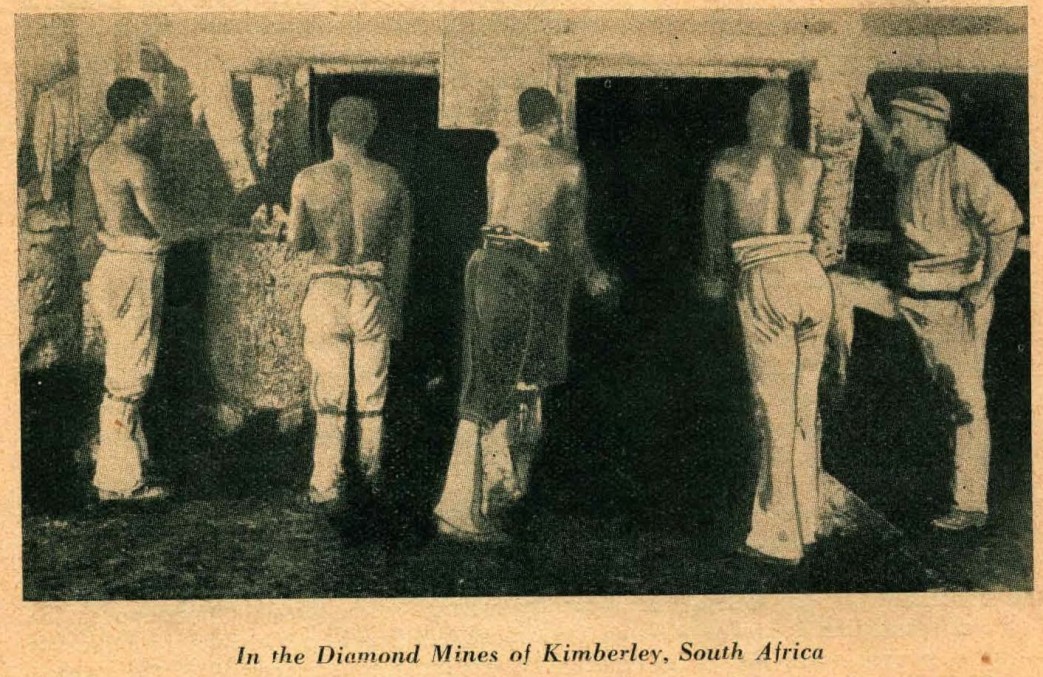
In the West Indies and in Cuba where the colonies which are what one may call one-crop-countries, depending in the main on the production of sugar, the crisis has been particularly severe and has affected large masses of Negro workers. The policy of the colonial government in the West Indies is a policy of liquidation of the peasantry and the creating of a huge army of agricultural workers who are compelled to work on the plantations owned by the absentee landlords and foreign Corporations. There are certain sections in the West Indies where one can go throughout the countryside and find tens of thousands of natives living in actual starvation. They are compelled to live in company huts and those who happen to be working are getting a miserable pittance. The sugar crisis has paralyzed the entire sugar industry in the West Indies, throwing thousands out of work in Cuba. On the Cuban sugar plantations where large number of West Indians slaved there are about 80,000 Jamaicans, and about 30,000 Haitians who are today being returned to their respective islands to starve. In order to stern the tide of the growing revolts of the masses the British “Labour” Government was forced to contribute something from the treasury to ease the conditions of the starving population.
But the local government, apart from some fake relief schemes gives no direct aid in any form. As a result of this situation there are increasing demonstrations against unemployment on the part of the workers in the West Indies. To be sure these demonstrations are largely spontaneous because in these countries where the movement like in Trinidad is under the complete leadership of the reformist Cipriani, these unions do not carry on any strike struggles or demonstrations. Only in the case of British Guiana had recently we of organized demonstrations and these demonstrations are taking on more and more a class character. In the last demonstration 2,000 or more workers a number
Disease infested homes of Negro workers in America for which they pay high rents to black landlords, participated marching through the streets with banners and flags demanding relief, no payment of rent, no evictions. This is also due to the fact that we have in the recent period aided this organization by means of an Open Letter, and other communications. Already we see as a result by the adoption of the demands which we have suggested to this union.
Afro-American Masses Destitute.
In the United States we have a situation, particularly in the Black Belt of the South, where the Negro masses are actually faced with a condition of destitution. Today in the United States, approximately one million Negro workers are unemployed. If we take large cities into consideration, if we take cities like New York, Chicago, Detroit, we find an immense disproportion between the Negro population and the number of Negro unemployed. We also find the increasing replacement of Negroes by white workers. The crisis has brought about a situation where the standard of living of white workers is being lowered particularly in the South to that of the Negro workers, with the result that the jobs which were formerly a complete monopoly of Negro workers due to low wages, are now being taken over by whites at even lower wages then the Negroes formerly received. Besides this the policy instituted by the local governments as in South and North Carolina has been to the effect that the positions formerly held by Negroes are now to be held by whites. I do not think I have to go into any explanations or reasons for this. It is quite obvious that the bourgeoisie attempts by this method to divide the working class and to place the major share of the burden of the crisis on the backs of the Negro masses. Coupled with this is the intensification of the terror and lynching of the Negro masses as exemplified in the case of the 8 unemployed Scottsboro boys who were framed up and condemned to be legally lynched.
In the struggle against unemployment in the United States the Negro workers have played a particularly important part and especially in Chicago and Cleveland, where the bourgeoisie through its ruthlessness and through its terror, massacred Negro workers in order to split the movement of the unemployed. We see a joint movement of white and black workers for the first time on a mass scale fight not only on the question of unemployment but on the question of Negro rights. At the funeral of a Negro worker that took place in Cleveland 30,000 workers participated. Approximately one-half was composed of white workers. There is a growing movement on the part of the white workers to fight in solidarity with the Negro workers, to fight against the terror and the condition of oppression imposed upon the Negro workers. It is the task of the T.U.U.L. to take the necessary steps to widen this joint movement of struggle, and to crystalize our growing influence organizationally. Our immediate task is the organization of the Negro workers into our revolutionary unions, for the joint struggle with the white workers against capitalism.
Editor’s note: This is the concluding part of the report of comrade O.E. Huiswood, Chairman of the Negro Trade Union Committee of the Red International of Labour Unions, made at the recent plenum of this organization. The first part, dealing with the effects of the capitalist crisis and the tremendous growth of unemployment among the Negro toiling masses in Africa, America and the West Indies appeared in the March issue of the “Negro Worker”. In this section of the report, comrade Huiswood reviews the counter-offensive of the Negro workers against the imperialists by means of strike struggles against wage cuts, demonstrations against unemployment and taxation leading to open revolts in the Congo and Equatorial Africa.
The Struggle Against Taxation and Terror.
The most important development in the recent period is the struggle of the native masses, particularly South Africa, West Africa, and the Belgian Congo, against the policy of increased taxation. Last year in South Africa alone, about 40,000 natives were jailed for being on the streets after prohibited hours. This alone shows that greater numbers of natives are violating the pass laws instituted by the bourgeoisie and landlords in order to prevent the workers from organizing. Daily drives are being launched on the part of the police for the purpose of collecting taxes from the natives. With the result that from 300 to 1200 natives are being held up every day for taxes. Besides, a new ordinance has been enacted to the effect that every native in South Africa must carry a poll tax receipt dating from the year 1925, and any failure to produce this receipt means immediate imprisonment or deportation. This indicates the increasing terror which is being spread among the natives in South Africa.
Throughout West Africa we can also see an increase of income tax, of poll tax etc. Beginning with the revolt in 1929 when 30,000 native women in Nigeria revolted against the imposition of taxation and organized tremendous demonstrations, we have witnessed other demonstrations against taxation. For instance, in the protectorate of Sierra Leone, hundreds of natives, led by an armed battalion, invaded the Kambia district and engaged in a struggle against the European officials who attempted to enforce the payment of hut taxes among the peasants. At Cape Coast in October of last year a tremendous demonstration of natives took place against income tax, which ended in the stoning of police barracks. In Sekondi there was also a tremendous demonstration of natives against this some form of taxation. Mass demonstrations are occurring in different parts of West Africa quite often at the present time against the increase of taxation, hunger and unemployment.
In the Belgian Congo the imperialists, faced with a budget deficit of 130 million francs are imposing new taxation upon the natives and have also, passed an ordinance to the effect that the price of cotton, which was formerly 1 franc 20 centimes per lb. is to be reduced to 60 centimes. Today the price of agricultural produce is 50% of what it was a year ago, resulting in the closing of many commercial centers and trading stations. This has given rise to mass unemployment and unrest among the toiling population. From the month of July up until the present time open rebellion has been going on. When the revolt is suppressed in one territory, it breaks out in another. In spite of the most brutal terror employed by the imperialists, the anti-imperialist movement continues to draw in ever wider masses.
In the developing struggles of the masses of South Africa against the offensive of the capitalists, the black and white masses are beginning to unite and take up the counter-offensive. A number of strikes have recently taken place, especially among the garment workers. In this industry we have the following situation: On the one side we have a number of native unions which are affiliated to the African Federation of Trade Unions, which is a section of the R.I.L.U., and on the other hand, we have some independent unions. But the bulk of the workers are in exclusively white unions affiliated to the reactionary Labour Council.
In spite of the terror of the police, in the splitting tactics of the reformists in Cape Town and the attacks of the Labour Department, the revolutionary Garment Workers’ Union was not only able to fight back the attempted wage cut of from 10 to 15 shillings, but it was also able to win certain demands in a counter offensive against the employers. Nevertheless there is a theory among some of our comrades in South Africa that in the present period it is impossible to develop independent strike leadership, that we do not have the necessary organizational strength for the development of independent strike leadership, and that we must have a combination with the reformists in an attempt to win any of our demands from the bosses. These false theories must be strongly combatted.
Another very important struggle in the recent period was the strike of the native workers in Durban last December against the pass law which involved about 6,000 workers. May Day 1931 was the first time in the history of South African labor movement that white and black workers came out together in a strong united front, struck, and demonstrated against the capitalists.
In a strike of the garment workers in Johannesburg a few months ago we witnessed the reformist leadership calling the workers out on strike but after the workers left the shops the leaders concluded a secret agreement with the bosses and withdrew the strike demands. The reformist leaders openly betrayed the workers by excluding the native workers from membership in this union, and from joint struggle with the white workers, thereby carrying out the imperialists policy of splitting up the working class.
In South Africa we have had for a long period up until the last few months the following disgraceful opportunist situation: A number of members of the Communist Party held responsible posts in certain independent white unions. Despite the fact that there were many possibilities to draw these white unions closer to the African Federation of Trade Unions in joint struggle, these opportunists held the theory that the time was not ripe to affiliate the white unions to the Federation. The result was, that within these white unions the comrades carried out a complete reformist policy of isolating these organizations from the general revolutionary trade union movement. Now of course most of these elements have been expelled. This now open up possibilities are for our revolutionary trade union movement to develop, and to attract the rank and file white workers who have shown since May 1st their readiness to struggle alongside of the native workers against the common enemy the South African bourgeoisie.
In the West Indies we have also had a number of struggles recently, particularly in Haiti where in the last few months no less than 5 strikes occurred: in the lumber, coffee and transport industries. In all of these strikes, the workers were successful in winning their demands.
Activities of the Negro Reformists.
There is one thing that must be taken into consideration and that is the class character of the recent struggles of the Negro masses which is exemplified particularly in the strikes in South Africa of white and black and secondly in the growing movement of joint action between Negro and white workers in the United States.
As a result of the increasing spirit of unrest among the Negro workers, we see the role of the Negro reformists who are openly going over into the camp of the imperialists, aiding the white capitalist exploiters in their attempt to suppress the revolts of the Negro masses. Our revolutionary movement has not sufficiently combatted or taken energetic steps to expose these Negro reformists.
In the United States this treachery has been exemplified, first of all, by wide sections of the Negro press in the Scottsboro case joining with the lynchers in attacking the International Labor Defense, the Communists and the revolutionary trade union movement. And secondly, the development within the labor movement of black social-fascism as shown by Randolph in the Pullman Porters Union who uses “left” phrases with a socialist tinge, but is trying to drag the Negro workers into the camp of the white social fascists-the American Federation of Labor, aiding Green to Jim Crow the black workers thereby openly betraying.
In South Africa we have seen the complete surrender of Kadalie and Champion to the British and Dutch imperialists and their fascist dictator, Pirow, while the “good boys” like professors Thaele and Jabavu are nothing else but black traitors and judases–the greatest enemies of the native toiling masses.
We must expose and fight more than ever against the policy of the Negro reformists, the black agents of the imperialist robbers.
The Tasks Before Us.
Comrades, in conclusion I want to say that the Negro revolutionary trade union movement, particularly in South Africa, which is still a young section of the R.I.L.U., with 5000 members, has started to make a turn in its work.
Formerly it concentrated mainly in the light industry and was able to draw to it the natives in the clothing, furniture, tobacco and laundry industries. Now it is beginning to give attention to the mining industry and transport workers.
Groups are being organized in these basic industries prior to building of unions. There are certain definite shortcomings of the African Federation of Trade Unions especially regarding a clear policy, a clear program of struggle, the development of cadres and the development of conscious leadership for our movement. Nevertheless we see already in the last few months a turn towards the line laid down by the 5th Congress to organize the majority of the working class into the African Federation of Labor. The task before us particularly in the African colonies is to consolidate the influence that we have, not only in South Africa but among the workers in Sierra Leone and in the other sections, to organize the workers to begin actually on the task of forming strong trade unions in these sections so that we may draw them into the orbit of the revolutionary movement.
In order to carry out this task we must put into effect the decisions of the 5th Congress of the R.I.L.U. The National Sections of the R.I.L.U. must make a racial change in their activities among the colonial workers. The question of organizing the Negro workers together with the white workers in the struggle against imperialism and to draw them into the revolutionary unions, this is the task which confronts the national sections of the R.I.L.U.
First called The International Negro Workers’ Review and published in 1928, it was renamed The Negro Worker in 1931. Sponsored by the International Trade Union Committee of Negro Workers (ITUCNW), a part of the Red International of Labor Unions and of the Communist International, its first editor was American Communist James W. Ford and included writers from Africa, the Caribbean, North America, Europe, and South America. Later, Trinidadian George Padmore was editor until his expulsion from the Party in 1934. The Negro Worker ceased publication in 1938. The journal is an important record of Black and Pan-African thought and debate from the 1930s. American writers Claude McKay, Harry Haywood, Langston Hughes, and others contributed.
PDF of full issue: https://www.marxists.org/history/international/comintern/negro-worker/files/1932-v2n3-mar.pdf
PDF of issue 2: https://www.marxists.org/history/international/comintern/negro-worker/files/1932-v2n4-apr.pdf
